Education
Staff Development: CEES Lecturers get Graduate Supervision Training
Published
3 years agoon
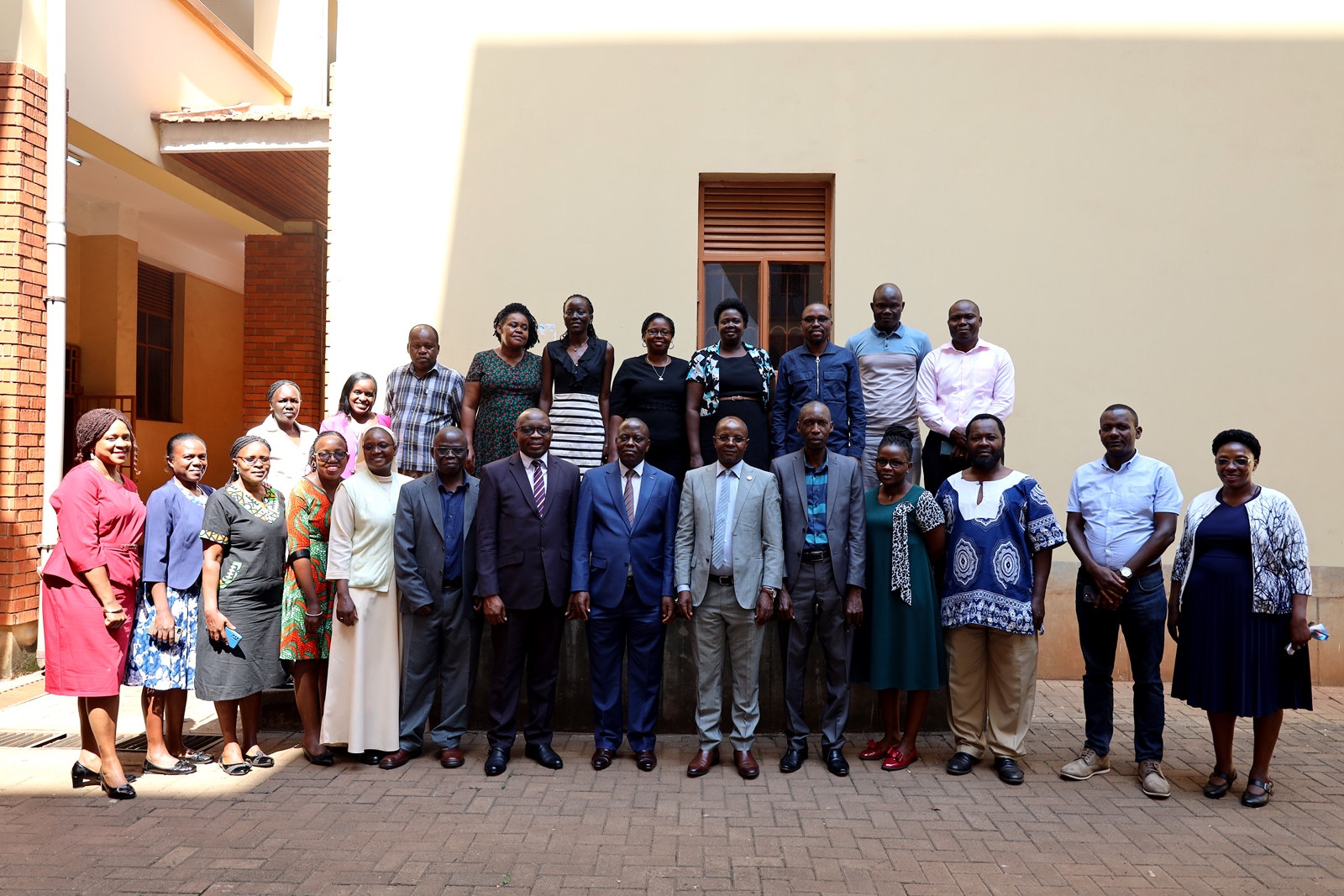
Staff of the College of Education and External Studies (CEES) concluded a two-day training in graduate supervision, with a call to ensure students graduate on time. The call was made by the Principal of the College, Prof. Anthony Mugagga while opening the training on August 10, 2023. Prof Mugagga said the college has previously had a low completion rate for graduate students a thing attributed to delays in feedback from both the lecturers and students. “We need to put in place a system that can prompt students and staff to give research feedback in time to allow more students to graduate,” he said. He said for Makerere to achieve her strategic goal of becoming a research-led University, the staff ought to contribute to this by improving graduate training for it is at the heart of this goal.
Prof. Mugagga said the college has introduced a graduate training accountability form, which will be used to track the progress of all students in an effort to see more students complete their studies.
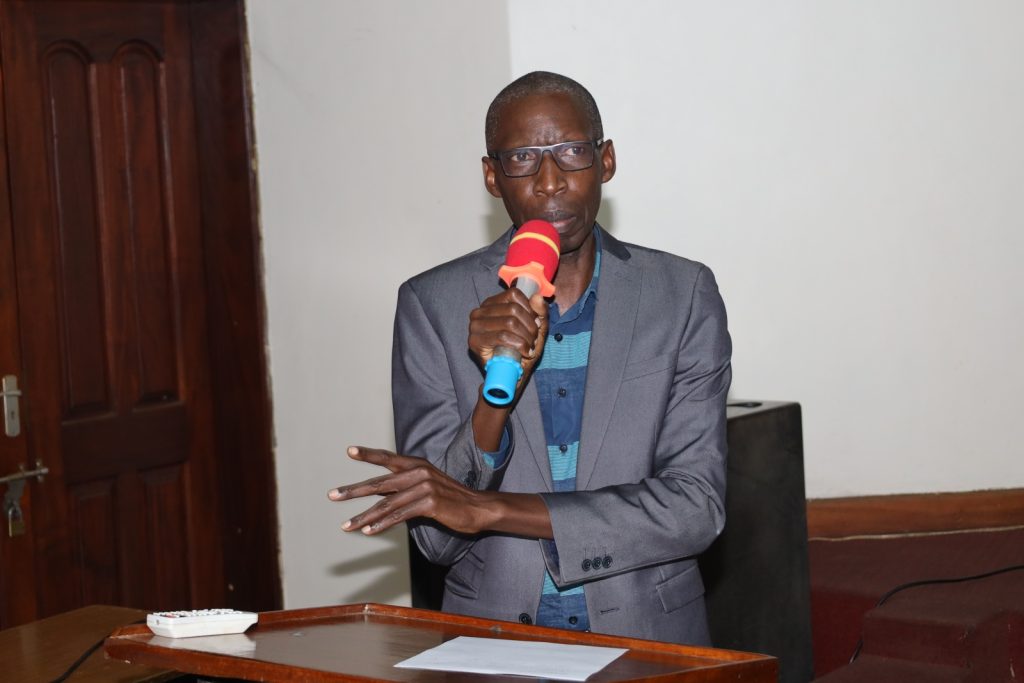
His remarks followed a presentation from the Deputy Principal, Prof. Ronald Bisaso, on the status of graduate training and CEES. Prof Bisaso shared that the college has between 2012 and 2023 had 114 students graduate with PhDs and has over 200 in the pipeline. He, however, noted that supervision has got some challenges which ought to be addressed by the senior staff of the college.
He said the 114 students had been supervised by a few staff, a thing he said needs to change to have more senior staff supervise students and ensure an increase in graduation/completion levels.
He urged the staff who recently acquired PhDs to engage in more research so that they too can help their students.
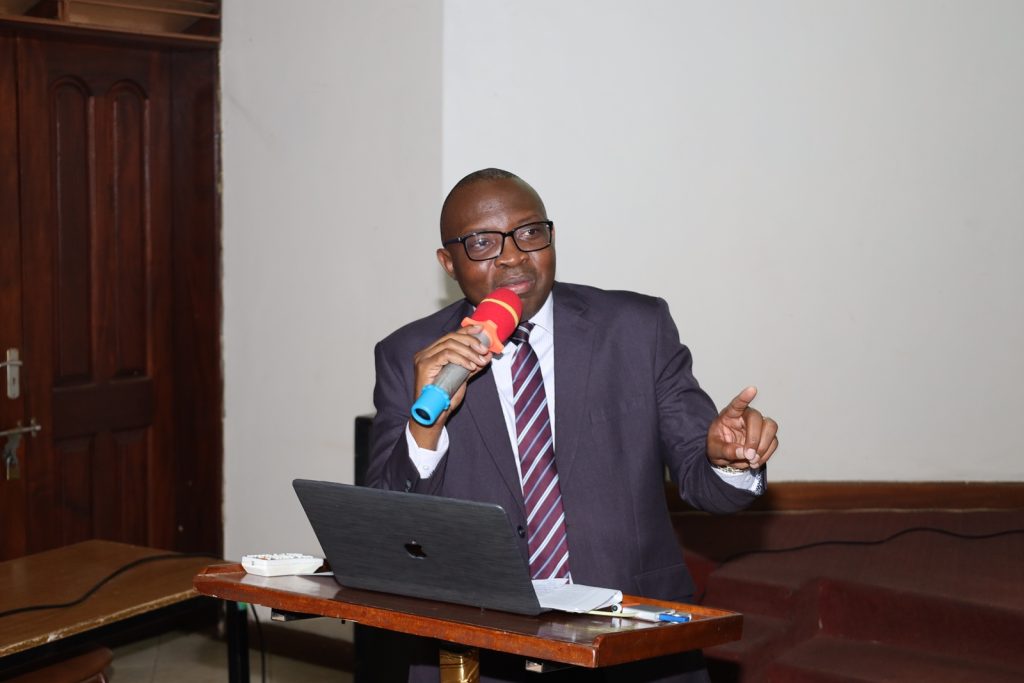
He noted that a needs assessment had showed that the most successful researchers are those that engaged in inter-disciplinary research.
“A good number of recent PhDs in CEES including those recently promoted have a trans-disciplinary experience. This has potential for creating multi-disciplinary teams to conduct research,” Prof. Bisaso said. It is envisioned that this will also give an opportunity for graduate training scholarships for students.
Speaking at the opening of the training, Prof. Edward Bbaale, the Director, Directorate of Research and Graduate Training (DRGT), appreciated the college management for the training, saying it is in line with the University’s strategic plan of being a research-led university. As the university moves into a research-led arena, it is envisioned that by 2030, the university will have an increase of 30% graduate students, 10% of whom are expected to be international students, Prof. Bbaale said.
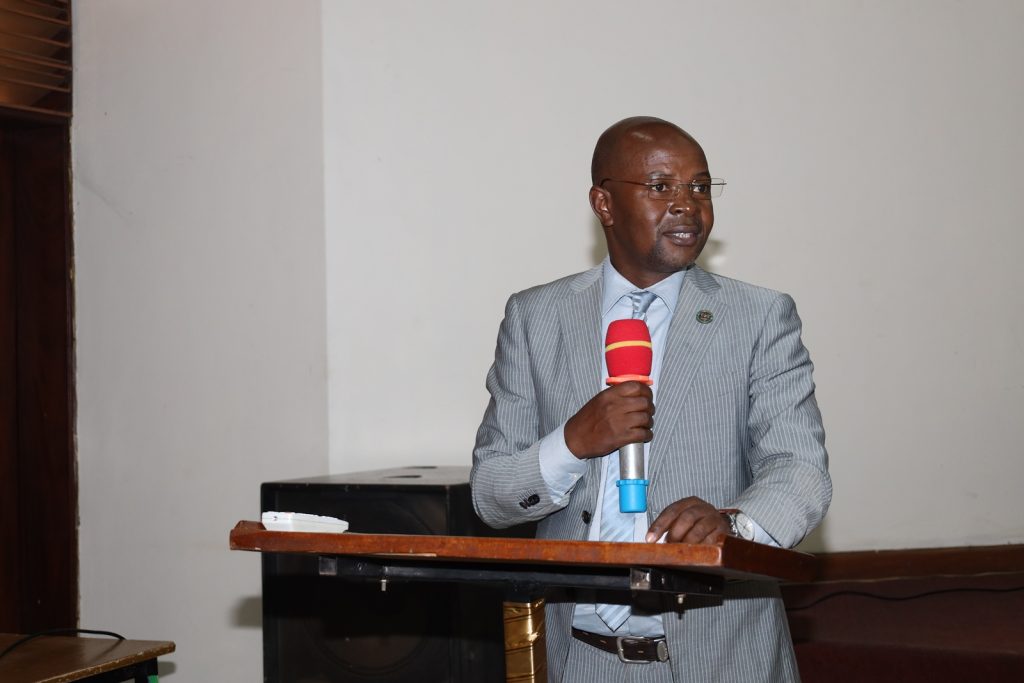
He called for the establishment of research entities at college level to allow for joint proposal writing and inter-disciplinary research.
The Makerere University Innovation Centre, he mentioned, will be in charge of spurring innovation, patents and commercialization of the products developed from the research.
Prof. Bbaale informed the staff that DRGT was in the process of revising the graduate handbook and digitalizing graduate students’ records in an effort to tract their progress. He also said the university has gotten a donor to fund the construction of a graduate building which will have offices and study facilities. He said the university was moving into aligning graduate training with the university almanac so that exams and completion are done at the same time.
He appreciated the Vice Chancellor, Prof. Barnabas Nawangwe, for steering the university into internationalization through the various collaborations and MoUs established.
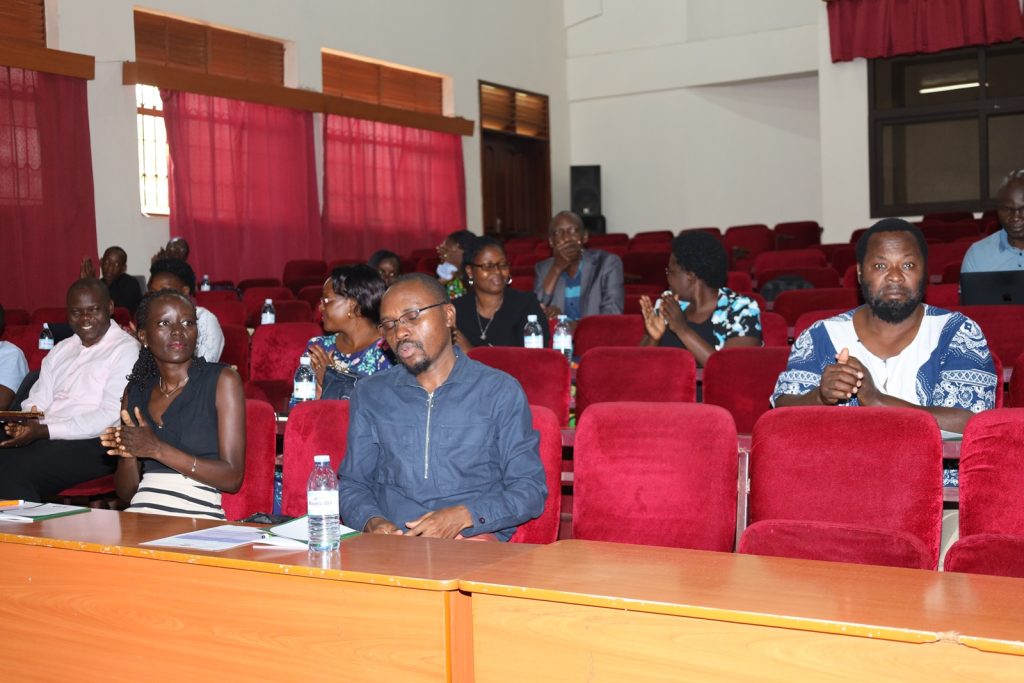
During the training, one of the trainers, Prof. Betty Ezati said it was important for supervisors to understand that supervision is not conducted in a vacuum but it is a consequence of our ideologies, values and conceptions.
She called on them to help the students develop expertise that should eventually exceed that of the supervisor, work to grow friendships and professional links, help a candidate gain a wide range of perspectives by creating opportunities for mingling with other professions with the same cause and guard against sharing the student’s weaknesses with colleagues.
Prof. Ezati advised against taking a one-size-fits-all approach to students, saying the individuality of a student must be acknowledged. She also advised against focusing only on the intellectual issues at the expense of the student’s emotional needs, being patronizing, undermining the student’s culture and religious affiliations and being too rigid.
Dr. Twine Bananuka shared with the trainees some best practices in supervision, which included; be purposeful in the task, balance formality and informality in the relations with the student, mind the social-cultural differences, have agreements and contracts, be value driven and accept your weaknesses and limitations.
While closing the two-day training, Dr. Misinde Cyprian, the Director, Quality Assurance Directorate (QAD) called on the staff to help students, saying many find it difficult to transition from the theoretical class of research methods to actually writing the research thesis, emphasizing that many need the help. He pledged DRGT’s support in organizing refresher courses for supervisors.
You may like
-


Advert: Admissions for Diploma/Degree Holders under Private Sponsorship 2026/27
-


Call for Applications: Diploma Holders under Government Sponsorship 2026/2027
-
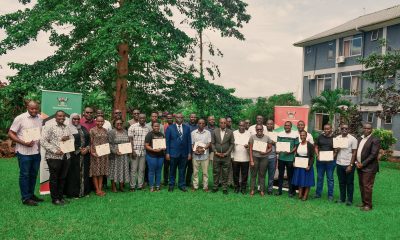

Thirty Public Officers Certified in Integrated Regulatory Cost-Benefit Analysis
-


Botswana Delegation Visits Makerere’s Public Investment Management Centre to Study Sustainable Training Model
-


200 UVTAB students graduate: CEES emphasizes Skills, Integrity and Community Impact
-


Makerere’s 76th Graduation Ceremony: CHS showcases research strength with 26 PhD Graduates
Education
200 UVTAB students graduate: CEES emphasizes Skills, Integrity and Community Impact
Published
5 days agoon
February 28, 2026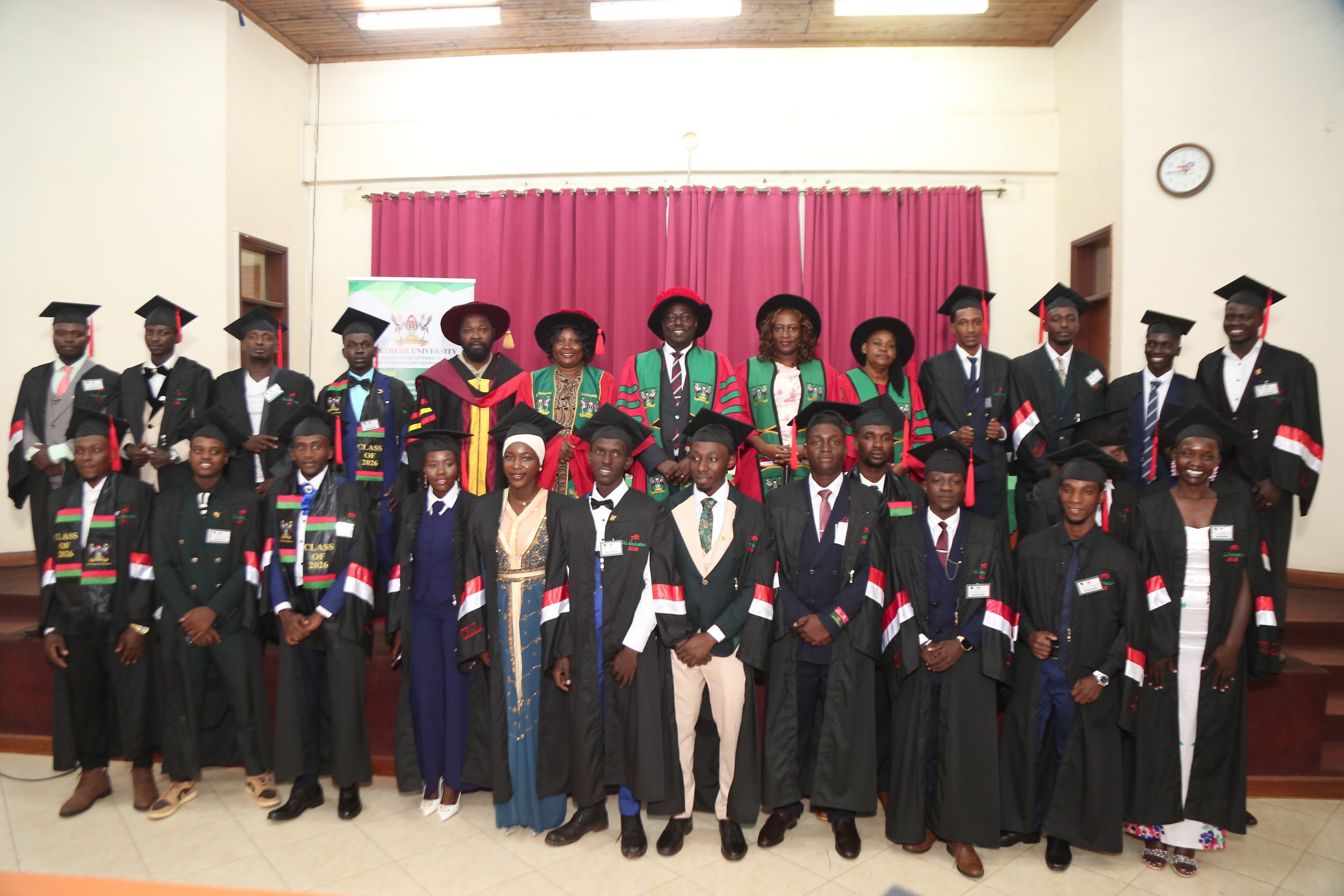
28th February 2026– On 28th Feb 2026, 200 students examined by the Uganda Vocational and Technical Assessment Board (UVTAB) were awarded National Diplomas and Certificates during the 7th graduation ceremony organized by the Centre for Lifelong Learning (CLL) under the College of Education and External Studies (CEES) at Makerere University.
The occasion marked a significant milestone not only for the graduates, but also for the university’s expanding lifelong learning and technical education mandate.
Speakers described the ceremony as a celebration of partnership, and the growing recognition of skills-based education as a driver of national transformation.
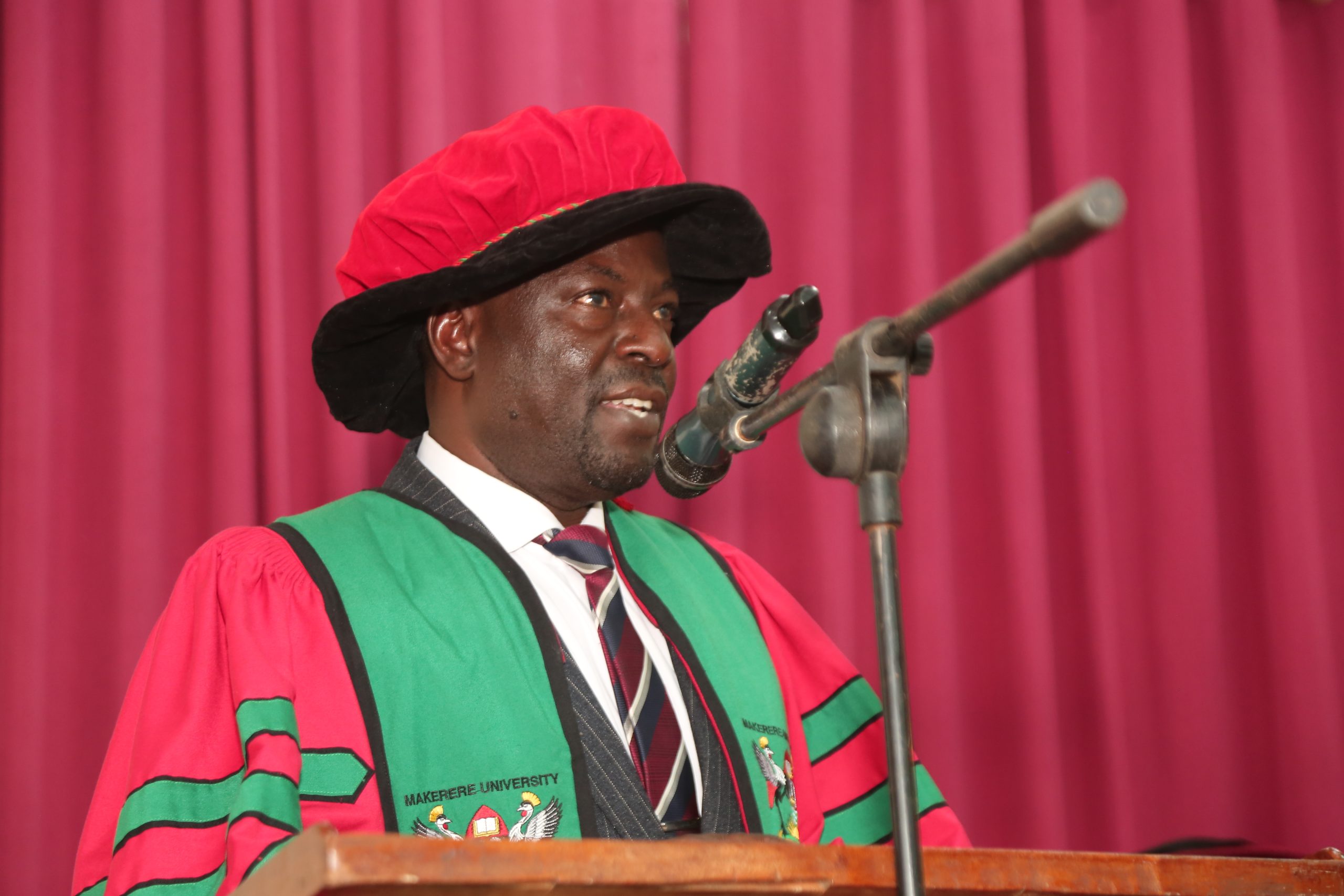
The celebration brought onboard graduands, parents and guardians. At the ceremony, the Principal of CEES, Prof. Anthony Muwagga Mugagga was represented by Prof. Paul Muyinda Birevu, the Director of the Institute of Open, Distance and e-Learning. The following University officials also graced the ceremony: Dr. Harriet Nabushawo-Dean, School of Distance and Lifelong Learning, Dr. Marjorie Batiibwe-Head, Department of Science, Technical and Vocational Education, Dr. Oscar Mugula-National Coordinator, Centre for Lifelong Learning, Dr. Rose Atugonza-former Coordinator of the Centre, and members of staff at the Centre for Lifelong Learning.
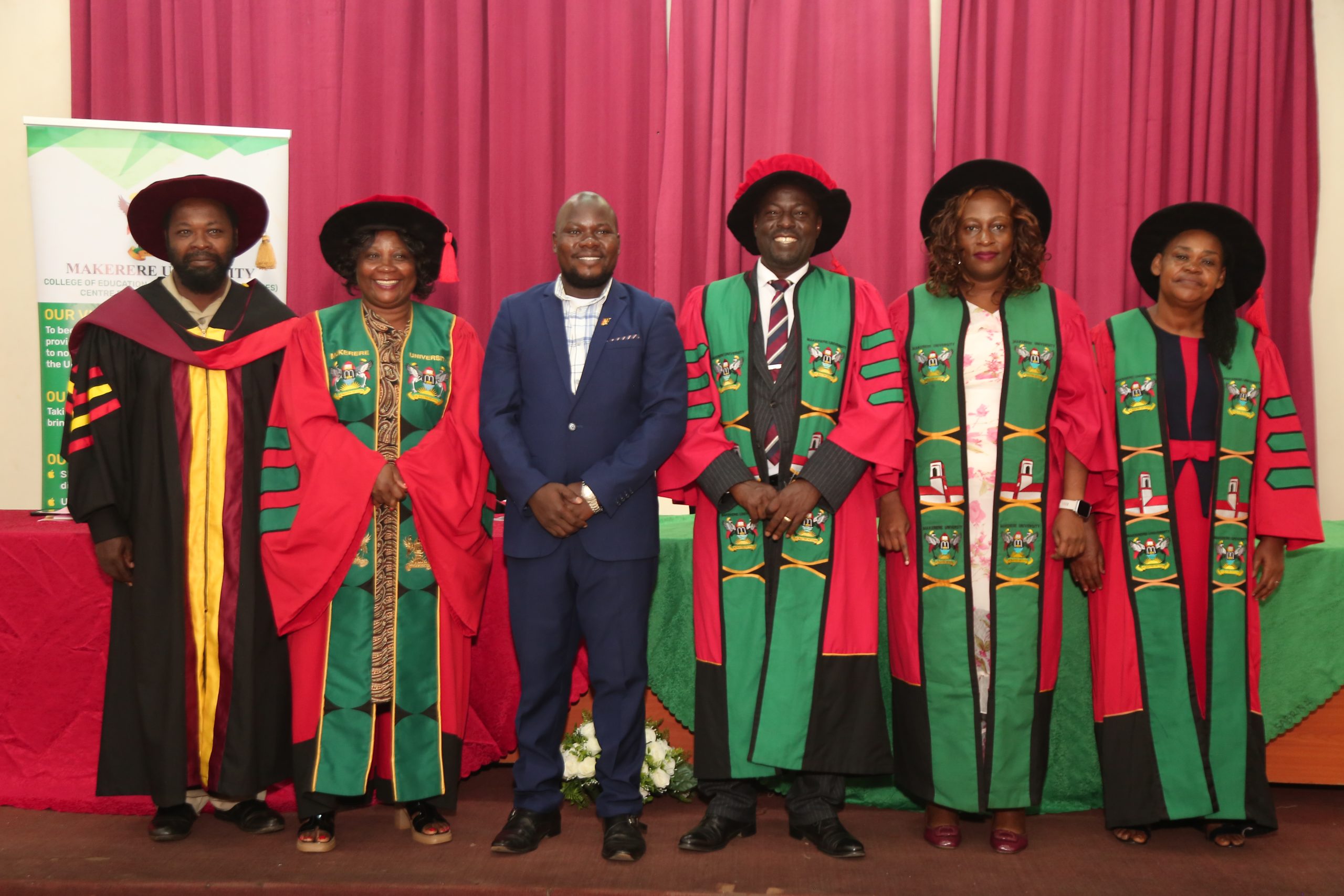
Vice Chancellor congratulates UVTAB graduates
The Vice Chancellor of Makerere University, Prof. Barnabas Nawangwe conveyed his regards, and congratulated the students, the Centre for Lifelong Learning under College of Education and External Studies (CEES), as well as, the College of Engineering, Design, Art and Technology (CEDAT) upon this academic milestone built on partnership, skills development, and lifelong learning.
In a special way, Prof. Nawangwe credited the students, supervisors, and instructors for undertaking the real-life project, which led to the construction of the wall fence at Makerere College School.
The wall fence constructed by students pursuing the National Diploma for Architecture, and Civil Engineering, was unveiled on 12th November 2025, and handed over to the Head Teacher of Makerere College School, Dr. Martin Muyingo.
A Milestone Built on Sacrifice and Partnership
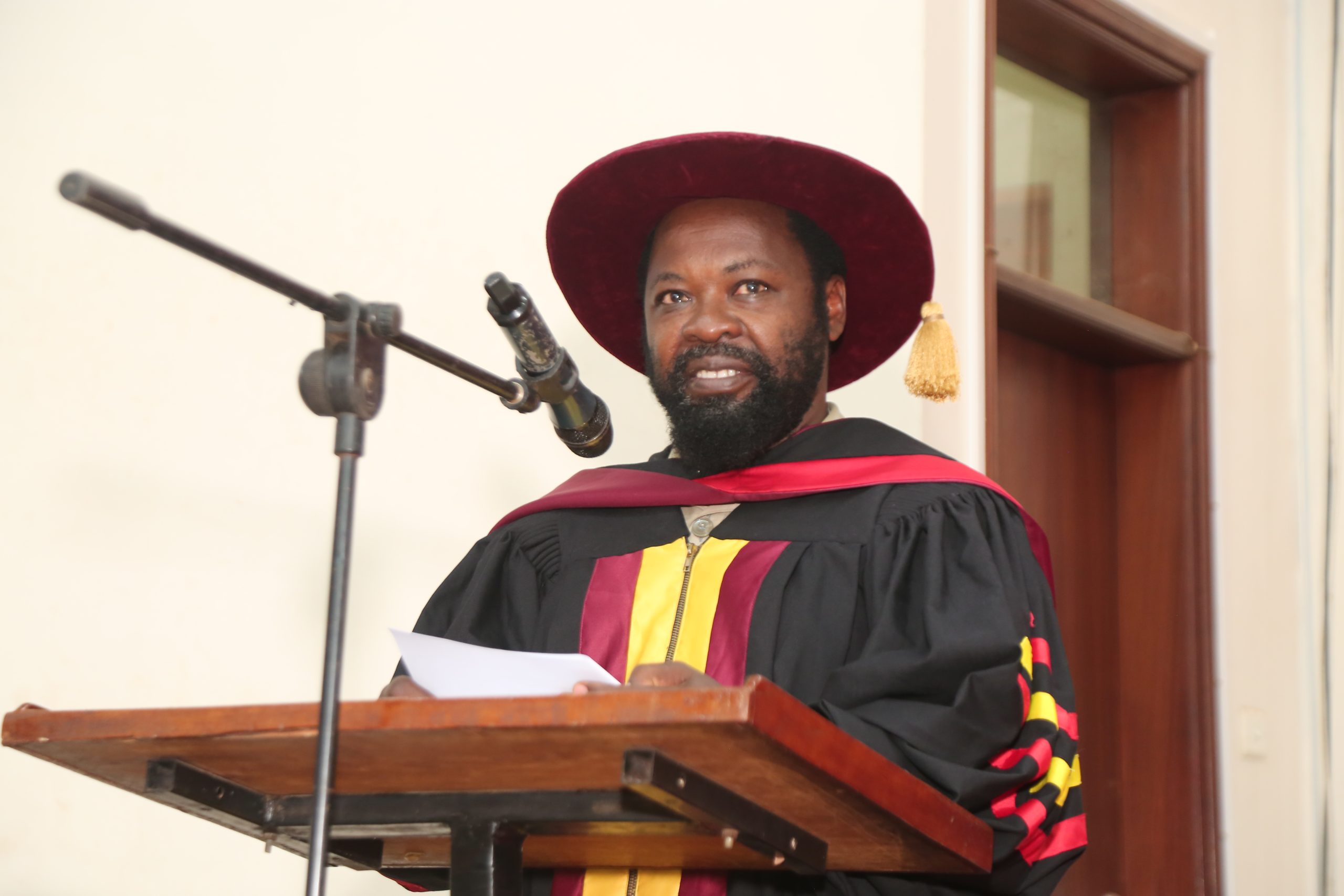
Addressing the congregation of graduates, parents, guardians, instructors, and invited guests, Dr. Oscar Mugula, the National Coordinator of the Centre for Lifelong Learning, acknowledged the sacrifices made by families.
“Today is not only about certificates and diplomas,” he said. “It is about the journey you have walked — the sleepless nights, the tuition sacrifices, the encouragement, and the belief that education changes lives.”
He thanked parents and guardians for standing by the students throughout their studies, describing their investment in education as one that yields long-term dividends for families and communities.
The graduation ceremony underscored the importance of institutional collaboration. Dr. Mugula extended gratitude to the leadership and management of CEDAT for the strong partnership that has enabled the Centre for Lifelong Learning to train and mentor students effectively. He commended instructors and trainers whose dedication shaped the graduates’ academic and professional growth.
“Our instructors have not only taught content,” he noted. “They have moulded character, built competence, and instilled discipline.”
Skills and Entrepreneurship are the New Currency
The Principal of CEES, Prof. Anthony Muwagga Mugagga, in a speech read by Prof. Paul Muyinda Birevu, the Director of the Institute of Open, Distance and e-Learning, emphasized that the qualifications awarded represent more than academic success — they signify practical competence.
“These qualifications certify knowledge, and affirm your ability to apply what you have learned in real-world contexts.”
The Principal reminded graduates that technical and vocational education is inherently practical, designed to solve problems and respond to industry demands.
“You are entering society at a time when skills are the new currency,” he stated. “Uganda needs technicians, innovators, engineers, administrators, planners, and entrepreneurs who can deliver results.”
The graduates received awards in diverse fields, including architecture, mechanical engineering, electrical engineering, civil engineering, accountancy, public administration and management, business administration and management, and project planning and management.
Embracing entrepreneurship
Prof. Mugagga called upon the graduates to embrace entrepreneurship. “Entrepreneurship begins with identifying the need of your society/community. I encourage you to master your craft/skill, and learn to work with teams, and develop a positive attitude towards work,” he said.
Graduation as the Beginning of Responsibility
While celebrating academic achievement, speakers cautioned graduates against viewing graduation as the final destination. “Today marks the end of one chapter,” Prof. Mugagga observed, “but it is the beginning of responsibility.”
He urged them to pursue mastery in their respective disciplines, emphasising that competence must go beyond minimum standards. “Be the graduate who says, ‘Give me the task, and I will deliver,’” he challenged.
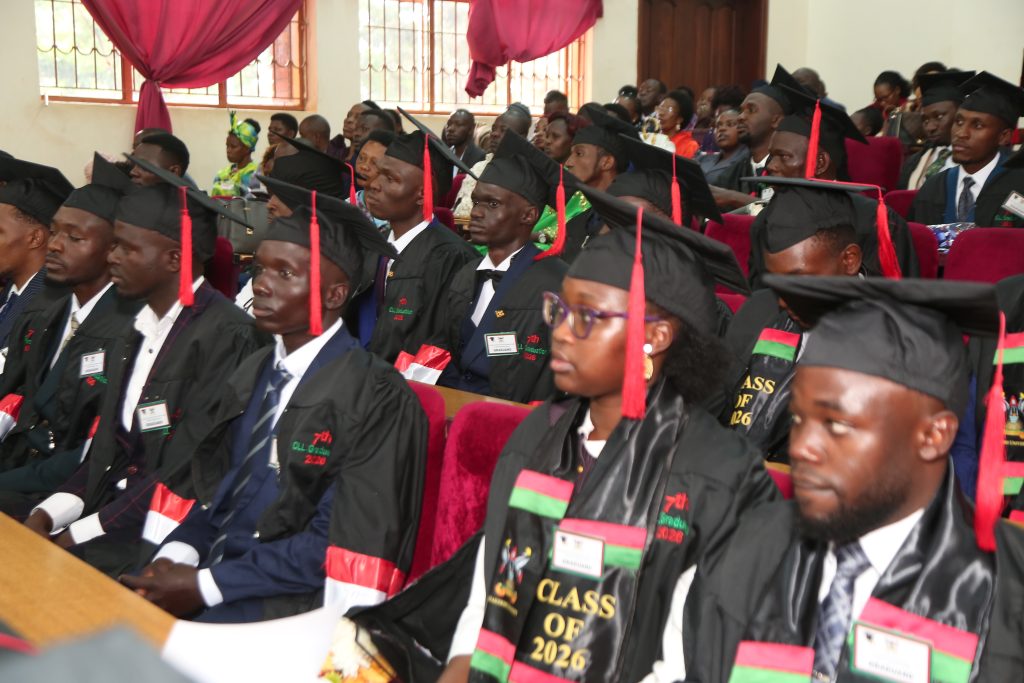
Graduates were encouraged to build professional identities anchored in integrity, reliability, and innovation. They were advised to maintain professional networks formed during their studies and to continue learning in order to remain relevant in a rapidly evolving global environment.
Dr. Mugula echoed this call, describing the graduates as “designers of change and leaders of tomorrow.” “You have crossed a bridge,” he said. “What lies ahead depends on the choices you make from today.”
Recognized Qualifications and Standards for further education
A key highlight of the ceremony was the reaffirmation that the diplomas and certificates awarded are nationally and internationally recognised under the Government of Uganda through UVTAB.
“The custodian of these awards is the Government of Uganda,” Dr. Mugula emphasized. “These qualifications meet standards required for further education and professional advancement.”
He encouraged graduates not to stop at the diploma or certificate level, but to consider advancing to degree programs locally and internationally. “A new journey begins today,” he said. “Plan for your dream degree. Take yourself to the next level.”
The message resonated strongly with students who had progressed from certificate level to diploma level — a transition celebrated during the ceremony as a testament to determination and growth.
Recognising Academic Excellence
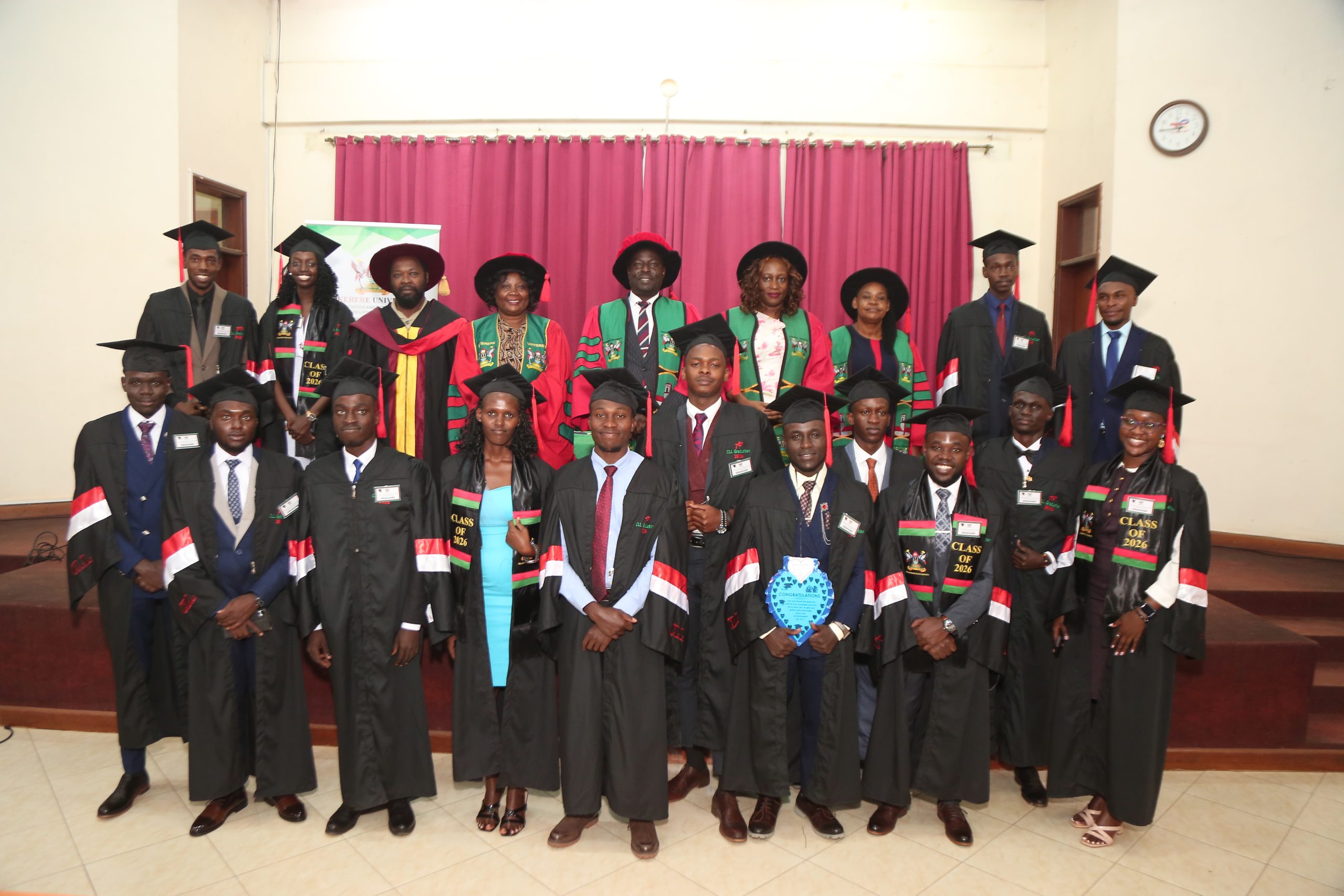
The ceremony also celebrated outstanding performers who graduated with First-Class Diplomas (GPA 4.4–5.0).
Among those recognised were:
Diploma in Public Administration
• Giibwa Dennise Kivumbi (4.63)
• Hussein Omar (4.41)
• Ssentale Peter (4.50)
National Diploma in Business Management
• Oyella Vivian Mildred (4.48)
National Diploma in Accountancy
• Nakiboneka Ritah (4.43)
• Nabaasa Annah (4.65)
• Olupot Jorem Dominic (4.42)
• Mulindwa Ashraf (4.53)
National Diploma in Civil Engineering
• Masaakate Joshua Robinson (4.53)
• Tamale Arafah (4.51)
• Kulumba Anwar (4.59)
Their achievement was met with applause from the audience, serving as inspiration to fellow graduates.
Giving Back to the Community
Beyond personal advancement, graduates were urged to remain ambassadors of the Centre for Lifelong Learning. “Most young people out there are not aware of these opportunities,” Dr. Mugula said. “Guide them. Encourage them to seek institutions whose qualifications are recognised.”
He called upon graduates to mentor others, share knowledge, and uplift communities. “That is how we build a stronger society,” he said. “You have come, you have seen, you have experienced. Now help others to benefit.”
The Centre’s motto — “Taking the University to the Communities and bringing the Communities to the University” — was highlighted as a reflection of its outreach philosophy. Established in 1953 as the Department of Extra-Mural Studies, the Centre has evolved into Makerere’s primary unit for community training and lifelong learning initiatives.
Character, Discipline, and Faith
In addition to academic and professional counsel, speakers emphasised moral grounding and discipline.
Graduates were advised to uphold integrity in their workplaces, avoid shortcuts, and resist societal pressures that undermine professionalism. “Your character will sustain your success,” Prof. Muyinda Birevu remarked. “Skills will open doors, but integrity will keep you in the room.”.
A Growing Role in Uganda’s TVET Landscape
The ceremony reflected Uganda’s broader efforts to strengthen Technical and Vocational Education and Training (TVET). The partnership between Makerere University and UVTAB demonstrates how universities and national assessment bodies can collaborate to expand access to quality, standards-based technical education.
Speakers commended the government for supporting TVET reforms and reaffirmed Makerere’s commitment to inclusive education pathways that serve both traditional and non-traditional learners.
As industries evolve and technology reshapes economies, the demand for competent, adaptable professionals continues to grow. The graduates, drawn from multiple disciplines, are positioned to contribute meaningfully to national development.
Looking Ahead
For the 200 graduates, the ceremony symbolised achievement earned through hard work and perseverance. Yet, as repeatedly emphasised, it also marked a beginning.
They leave equipped with recognised qualifications, practical training, and the encouragement of mentors and families. They carry the responsibility to apply their knowledge ethically, pursue continuous improvement, and uplift their communities.
As the event drew to a close, the central message remained clear: Graduation is not merely a celebration of past effort — it is a launchpad for future impact.
“Go out and seek jobs with confidence — you have the skills,” Prof. Muyinda Birevu told them. “Create jobs with courage — you have the innovation.”
With that charge, applause filled the hall, marking not just the award of diplomas, but the commissioning of a new cohort of skilled professionals ready to transform society.
Education
Mak 76th Graduation Ceremony: CEES Celebrates Academic Excellence, with 27 PhDs
Published
1 week agoon
February 24, 2026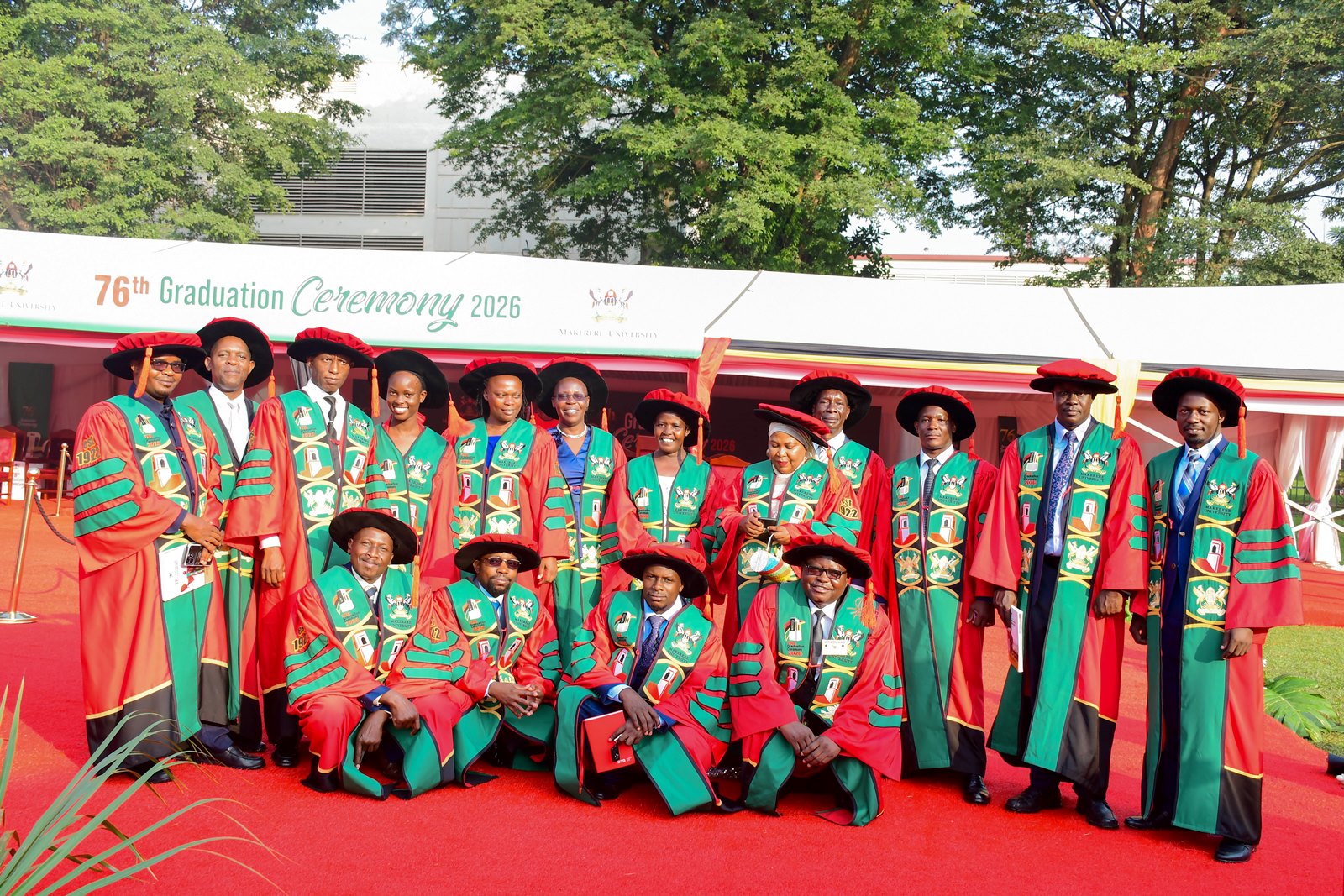
24th February 2026– Makerere University officially commenced its 76th Graduation Ceremony, setting the stage for a four-day celebration of academic excellence scheduled to run until 27th February 2026. The landmark event brought together government and university officials, faculty, staff, graduands, parents and guardians, development partners, and the media, in a vibrant display of achievement. A total of 9,295 graduands were presented by the respective colleges for the conferment of degrees and the award of diplomas and certificates.
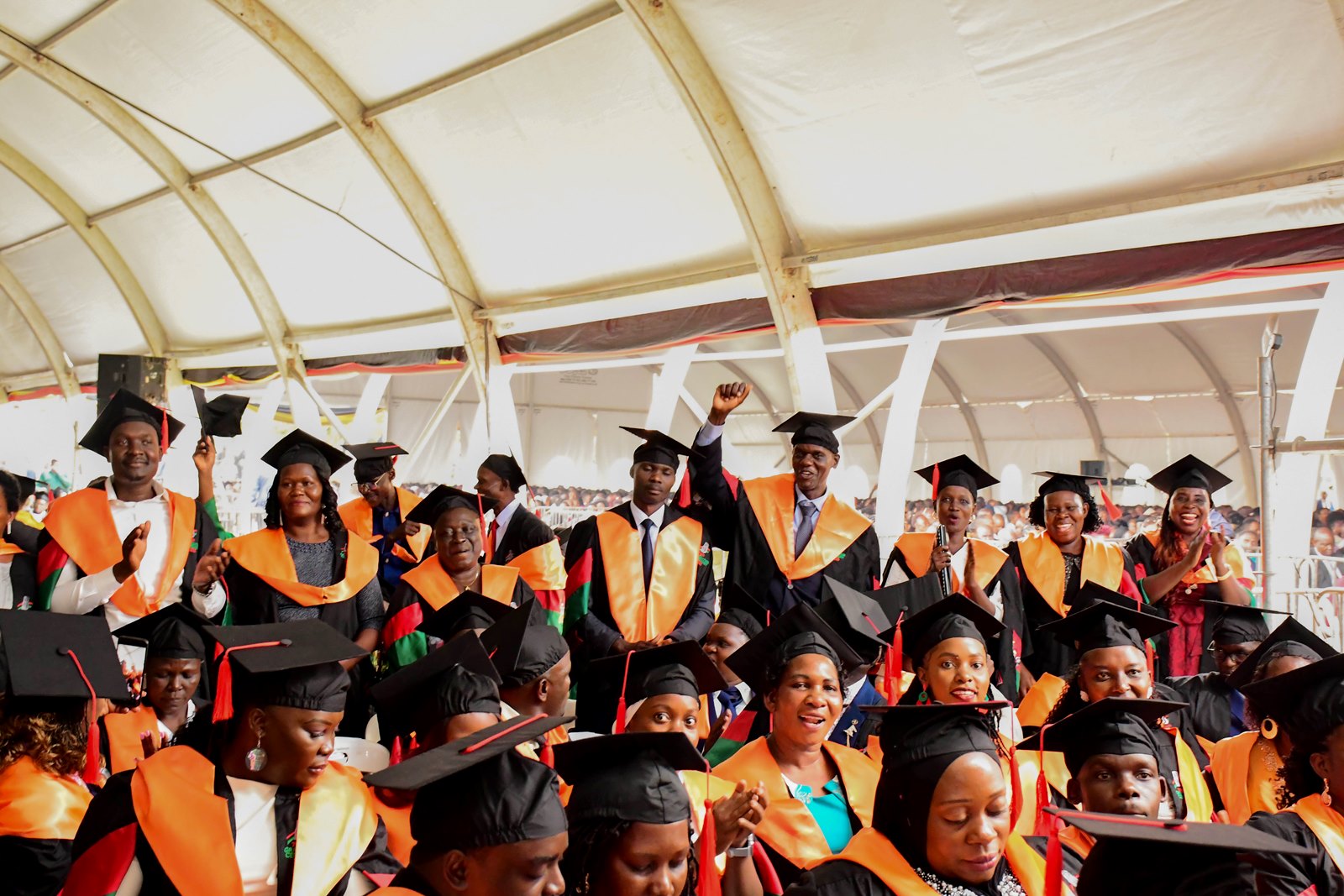
On the first day, presided over by the Chancellor, Hon. Dr. Crispus Kiyonga, the congregation at the Freedom Square witnessed Principals, Deputy Principals, Deans and faculty presenting students for graduation from the following colleges: Agricultural and Environmental Sciences (CAES), Education and External Studies (CEES), Computing and Information Sciences (CoCIS) and the School of Law.
CEES Graduation Statistics
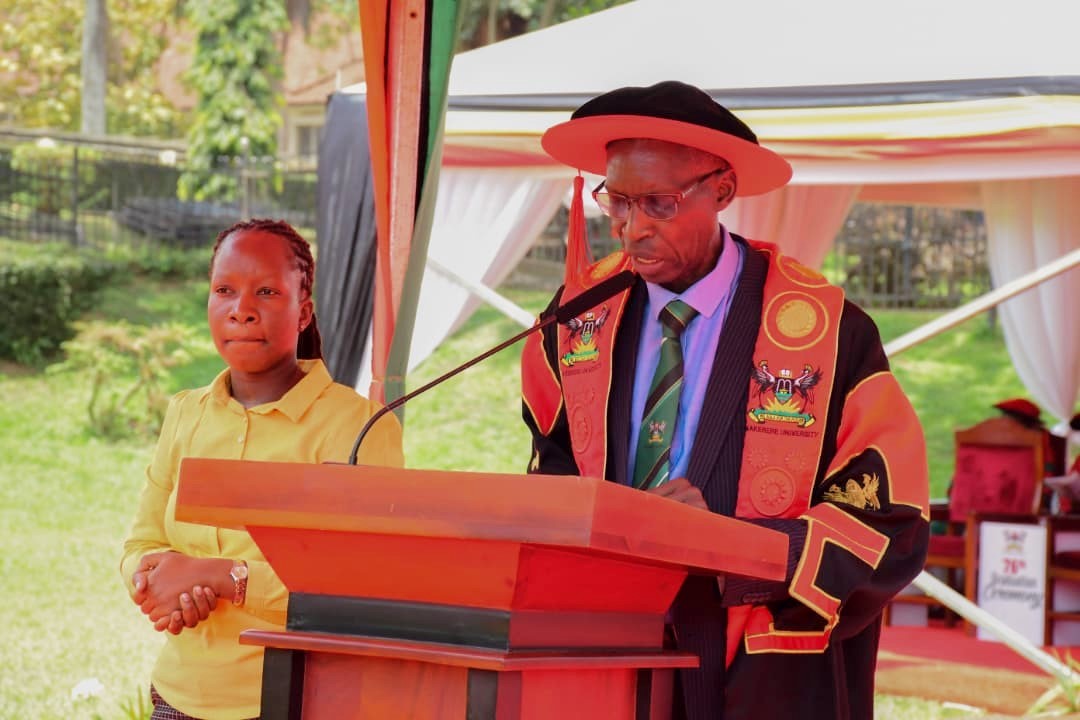
The College of Education and External Studies (CEES) presented 824 graduands for the conferment of degrees and the award of diplomas. These included 27 Doctor of Philosophy (PhD) degrees, 106 Master’s degrees, 111 Postgraduate Diplomas, 572 Bachelor’s degrees, and 8 Diplomas—a reflection of the College’s strong postgraduate research profile and its continued investment in advancing professional and teacher education.
CEES champions digital transformation and Competence-Based Education
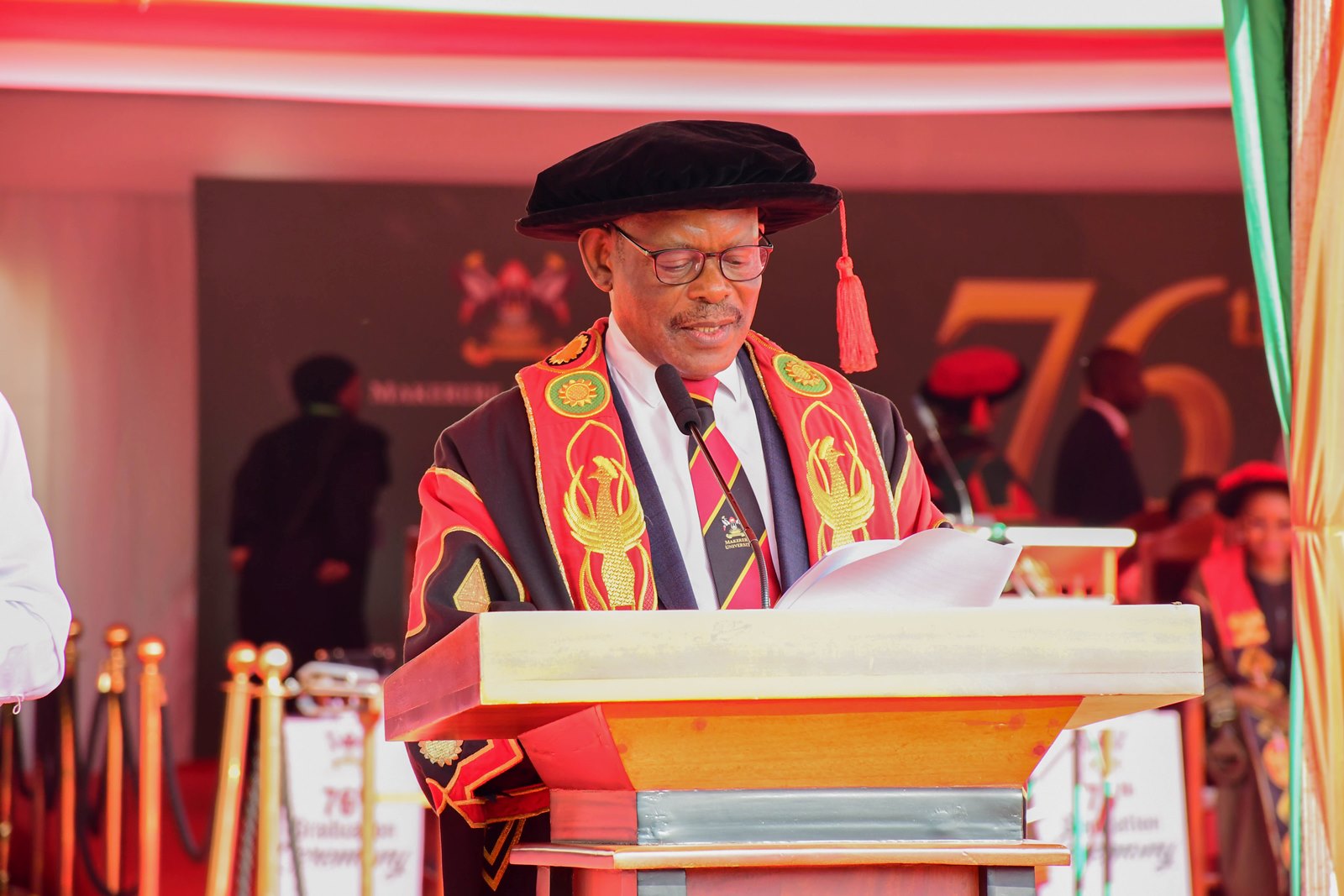
Addressing the congregation, the Vice Chancellor of Makerere University, Prof. Barnabas Nawangwe, underscored the strategic role of the College of Education and External Studies (CEES) in driving the University’s digital and pedagogical transformation. He observed that CEES has remained at the forefront of championing Makerere’s digital agenda, notably through the institutionalisation of the Institute of Open, Distance and eLearning.
“The College of Education and External Studies continues to play a pivotal role in Makerere University’s digital and pedagogical transformation by Championing the digital transformation of Makerere University. In pursuit of digital transformation, Makerere University institutionalised the Institute of Open, Distance, and eLearning effective January 1, 2025. The College, through the Institute of Open, Distance, and eLearning, in collaboration with the College of Engineering, Design, Art and Technology (CEDAT), is implementing a KOICA-funded project aimed at enhancing the distance education environment at Makerere University,” Prof. Nawangwe said.
The Vice Chancellor noted that the initiative reflects Makerere’s deliberate shift towards innovative, technology-enabled learning models designed to expand access, enhance quality, and position the University as a leader in digital higher education in the region.
He explained that the initiative has already yielded significant milestones, including the development and approval of a 10-year Distance Education Master Plan (2025–2035), the construction of a four-storey Open, Distance and eLearning Centre, and the capacity building of academic staff in multimedia e-content production.
He emphasized that these efforts, alongside the ongoing Phase II of the eLearning Initiative supported by the Mastercard Foundation, demonstrate Makerere’s resolve to integrate online and face-to-face learning in expanding access to quality higher education.
Affirming CEES’ growing continental stature, the Vice Chancellor applauded the College for its leadership in advancing Competence-Based Education (CBE) across Africa. He reported that in 2025, CEES successfully coordinated eight partner institutions and secured a prestigious €1 million ERASMUS+ grant to spearhead the institutionalisation of CBE in East and West Africa.
Through the Transitioning Higher Education Regulators and Universities to Competence-Based Education (TRUCE) initiative, he noted, the College is working collaboratively with regulatory bodies, universities, and industry stakeholders to realign teaching methodologies, assessment frameworks, and digital integration towards demonstrable learner competencies that respond to labour-market demands and societal priorities.
Graduates urged on entrepreneurship and employment
To the graduates, Prof. Nawangwe reminded them of the prestige and responsibility that comes with a Makerere degree, “You are graduating with a degree from one of the best universities on earth. We have equipped you with the knowledge and skills that will make you employable or create your own businesses and employ others. Do not despair if you cannot find employment; instead reflect on the immense opportunities around you and rise to the occasion as an entrepreneur. Do not despise humble beginnings. To the graduands of PhDs, you are now global science citizens. Africa expects much from you. Use your degree to transform our Continent.”
Funding of Research and Innovation
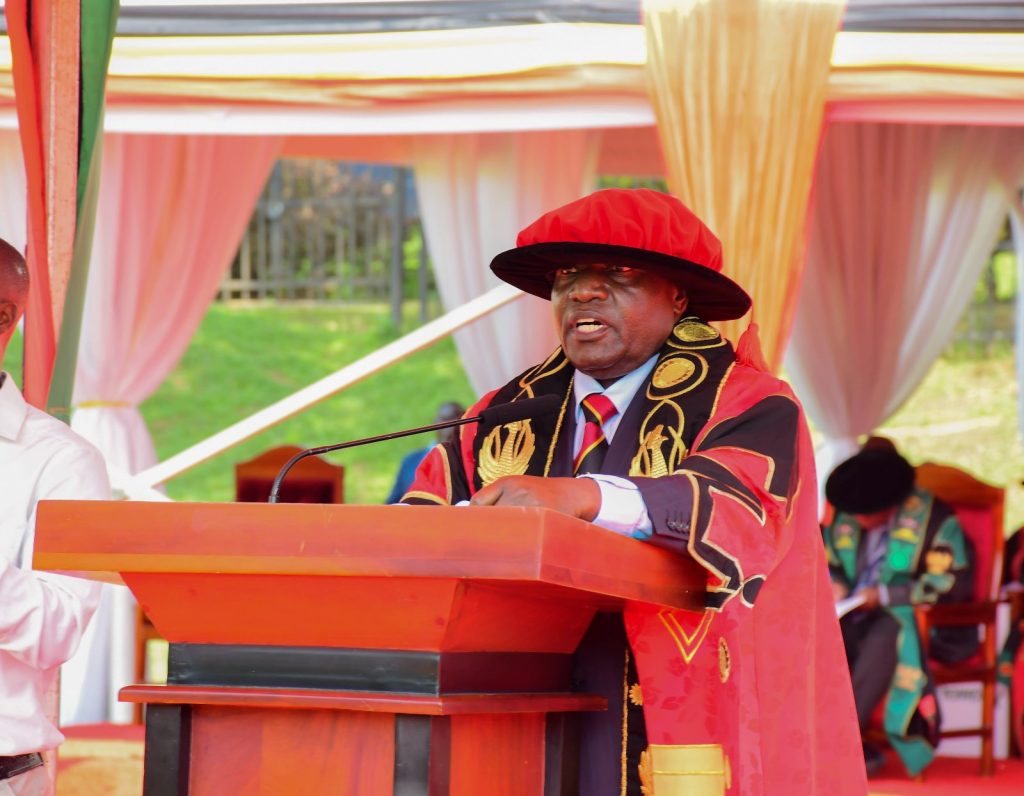
The Chancellor, Hon. Dr. Crispus Kiyonga stated that research plays a very vital role in the development of any community. In this regard, the Chancellor thanked the government of Uganda for committing UGX 30 Billion through the Makerere University Research and Innovation Fund (MakRIF). He lauded the Ministry of Science, Technology and Innovation Secretariat-Office of the President for supporting research initiatives at Makerere University aimed at promoting home grown solutions to our various challenges.
The Chancellor called upon the graduates to tap into opportunities at the University to broaden their knowledge on the world, communities and societies.
Government Commits USD 162 million concessional loan for Laboratory and Infrastructural development, orders shift to Competence-Based Education.

The Guest of Honour, Hon. Janet Kataaha Museveni, Minister of Education and Sports and First Lady of Uganda, represented by State Minister for Primary Education, Hon. Dr. Joyce Moriku Kaducu, commended Makerere University for its pivotal role in nurturing leaders, sharpening scholars, and giving direction to dreams. She congratulated the University Council, management, staff, and graduands for their dedication, noting that Makerere continues to serve as a model institution for academic excellence and national development.
Addressing the transition to Competence-Based Education, the Minister restated the directive that all higher education institutions must prepare for full implementation of Competence-Based Education and Training by July 2027. She urged Makerere University, and particularly CEES, to lead in curriculum reform, staff training, and infrastructure development to ensure graduates are equipped with practical skills, innovation, and problem-solving abilities.
“As we celebrate today’s achievements, we must also look far to the future. I reiterate a key directive from the Ministry of Education and Sports: all institutions of higher learning must prepare for the full implementation of Competence-Based Education and Training by July 2027. This is not merely a policy change; it is a fundamental shift in how we prepare our graduates. We are moving toward a model that emphasizes practical skills, innovation, and problem-solving. I request the Vice Chancellor and your team to lead the way in curriculum reform, staff training, and infrastructure development to make Competence-Based Education (CBE) a reality,” she said.
The Minister highlighted the Government’s deliberate investments in higher education, particularly in research, innovation, infrastructure, and academic development. She underscored key initiatives including the Makerere University Research and Innovation Fund (Mak-RIF), which supports high-impact research and innovation addressing national priorities, and the USD 162 million concessional loan for modernizing university infrastructure, including state-of-the-art laboratories and smart classrooms. The minister reaffirmed the Government’s commitment to strengthening higher education through research funding, digital transformation, and strategic partnerships, emphasizing that universities must not only produce graduates but also solution-makers and job creators.
In her message to the graduands, the minister urged graduands to use their degrees to solve problems and create jobs, emphasizing the need for innovators, engineers, healthcare professionals, and educators. She encouraged them to stay adaptable, creative, ethical, and committed to lifelong learning, while seizing opportunities like the Parish Development Model to drive sustainable community transformation.
Commencement Speaker encourages Knowledge with Purpose and Service with Integrity
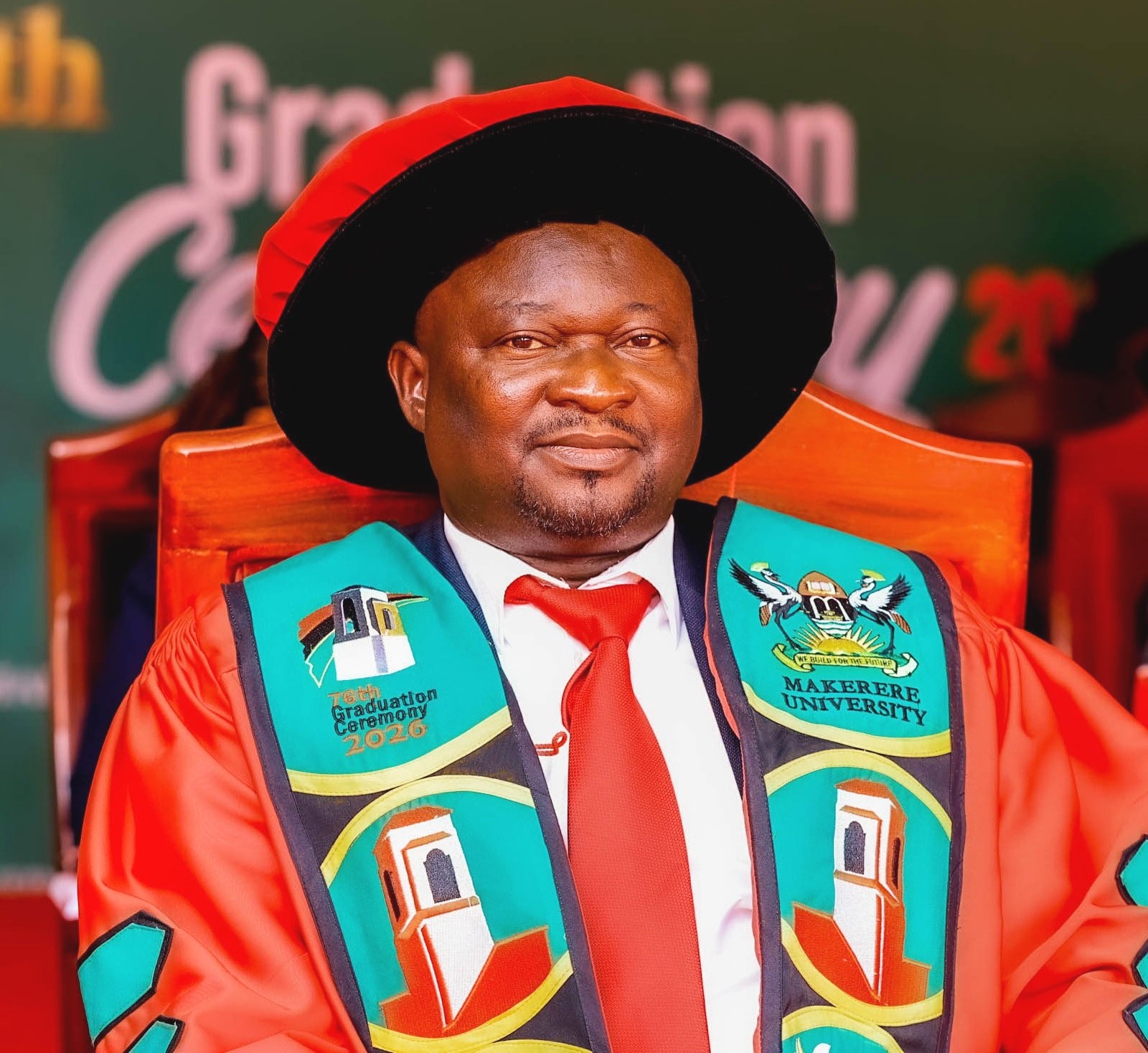
Delivering the commencement address under the theme “Knowledge with Purpose, Service with Integrity”, Prof. Nicholas Ozor, Executive Director of the African Technology Policy Studies Network, reminded graduates that Makerere University has long been a beacon of scholarship and a home for thinkers, innovators, reformers, and leaders. From its halls have emerged presidents, jurists, scientists, educators, technologists, and agricultural pioneers whose work has shaped Uganda, the continent, and the world. Prof. Ozor informed graduands of the storied legacy they had joined, marking both the end of one chapter and the beginning of another; one that demands knowledge, courage, creativity, integrity, and service.
“From these halls have emerged presidents, jurists, scientists, educators, technologists, and agricultural pioneers whose ideas have shaped not only Uganda, but the continent and the world. Among those who studied here are former Presidents such as Julius Nyerere, Mwai Kibaki, Milton Obote, Benjamin Mkapa, and Joseph Kabila. Graduates, today you join this storied legacy of a great citadel of learning. This moment did not come cheaply. It was earned through late nights, failed attempts, financial strain, resilience, and persistence. Today we celebrate your achievement—but even more, we recognize your responsibility,” he articulated.
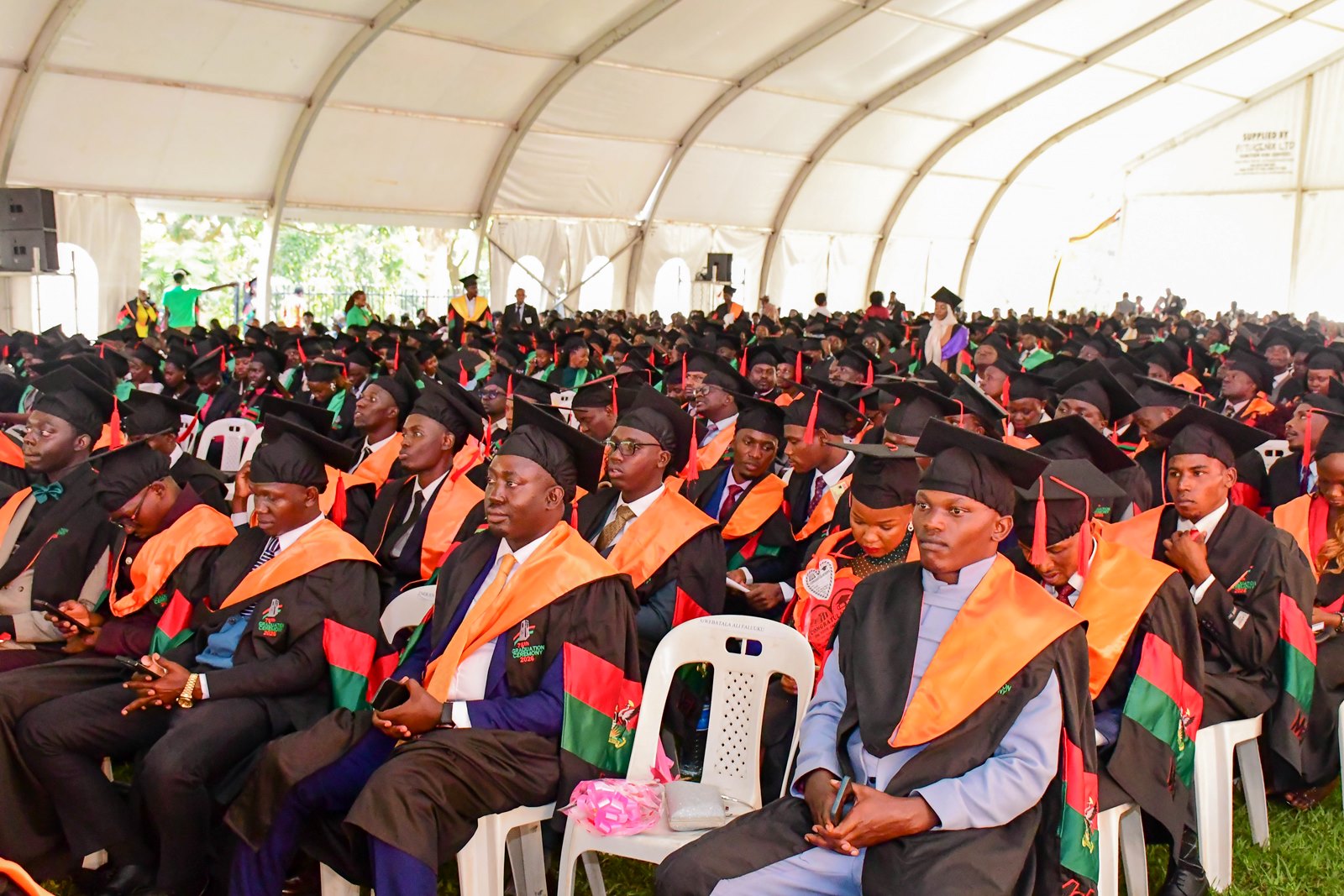
Addressing the CEES graduands, he emphasized that they are custodians of the future, noting that the quality of teachers directly shapes the future of nations. He urged them to never underestimate the power of the classroom, to teach not only for examinations but for understanding, to teach both content and character, and to cultivate critical thinking rather than rote knowledge. He described education as quiet work whose impact echoes across generations.
Beyond CEES, Prof. Ozor delivered key lessons for all graduates, stressing that character, integrity, humility, and resilience will outlast certificates and grades. He encouraged them to embrace lifelong learning, choose purpose over comfort, build character before career, serve something larger than themselves, and believe in Africa by taking initiative to solve its challenges. He pointed out that failure is part of growth, urging them to let it refine rather than define them.
He acknowledged the sacrifices of parents and guardians, noting that their financial, emotional, and spiritual support is embedded in every certificate awarded. Prof. Ozor concluded with a call for graduates to carry the values of Makerere into the world, whether in government, private sector, civil society, academia, or entrepreneurship. He encouraged them to build justice, minds, systems, and sustainable futures, honoring their families, their nation, and the University itself, reminding them that the future is watching and waiting for their contribution.
Photo Credit: Christopher Kaahwa – Communications Practitioner
Education
Facilitating Access and Participation through Higher Education Access Programmes and Connected Education for Students with Refugee Backgrounds: A Global South Delphi Study
Published
3 months agoon
December 19, 2025
On 17th December 2025, a Delphi workshop was convened at Kampala Kolping Hotel, providing a collaborative platform for dialogue on standardisation and harmonisation of Higher Education Access Programmes (HEAP) across institutions, alongside strategies for portability and verification on demand through a HEAP Digital Passport. Discussions centered on accreditation, diversification of delivery and learner support, and future scenarios for HEAP and Connected Education.
Expert panelists underscored the urgent need for:
- Standardised HEAP frameworks across universities to ensure consistency in admission pathways.
- Harmonisation of HEAP curricula, duration, and procedures to eliminate barriers that hinder access and transition.
- Development of a HEAP Digital Passport enabling portability of credentials, secure digital verification, and integration with national qualification frameworks and international recognition systems.
Uganda, is one of the leading refugee-hosting countries with inclusive education policies, faces challenges in ensuring equitable access and participation for students with refugee backgrounds. While some universities offer HEAP as a bridging programme for marginalized learners, variations in programme design, delivery, and support systems still exist, which may lead to violations of accreditation. This calls for urgent standardisation and harmonisation to strengthen HEAP as a recognized transitional pathway into higher education.

Funded by Education Beyond Borders, researchers from Makerere University and the University of Edinburgh engaged stakeholders from public and private universities in Uganda through participatory workshops and expert meetings. This Delphi Workshop aimed providing a collaborative platform for dialogue on standardisation and harmonisation of Higher Education Access Programmes (HEAP) across institutions, alongside strategies for portability and verification on demand through a HEAP Digital Passport. Discussions centered on accreditation, diversification of delivery and learner support, and future scenarios for HEAP and Connected Education. The project is led by Dr. Rovincer Najjuma (Principal Investigator), with co-PIs Dr. Rebecca Nambi and Dr. Michael Gallagher.
Listening to experiences and co-creating solutions

Opening the workshop, Dr. Rebecca Nambi, a Senior Lecturer at Makerere University and Co-Investigator of the project, emphasized that the engagement was not about formal presentations, but about listening to experiences of students with refugee backgrounds that have accessed Higher Education using the HEAP programme and co-creating solutions with Expert Panelists.
Highlighting the persistent disparities in refugee participation in higher education, Dr. Nambi explained that while global and national efforts often focus on primary and secondary education, higher education remains critically under-supported. Drawing on years of research, she observed that refugee participation in higher education has historically stood at three percent (3%), later improving to about seven percent (7%), leaving the highest number of refugees excluded.
“Where do they go if they do not transition to higher education?” she asked. “Who supports them and how do institutions respond when learners arrive with disrupted educational trajectories?”
Shift from mere documentation of marginalization and adversity to practical interventions
Dr. Nambi underscored the importance of moving beyond research that merely documents marginalizationa and adversity. She advocated for practical interventions that improve systems for people with refugee backgrounds and strengthening education for host communities. “Addressing refugee education is part of a broader global agenda shaped by migration, conflict, and labour mobility in several countries.”
Dr. Nambi emphasized that HEAP provides a legitimate pathway for students with refugee backgrounds, and the ongoing adjustments aim to align the program with national standards and student needs.
Central to the discussion was the concept of connected learning, which promotes flexible, blended, and digitally supported education pathways that link learners across institutions, resources, locations, and systems.
Referencing the Makerere University E-Learning Environment (MUELE) as a key enabler of digital and interactive learning between lecturers and students at Makerere University, Dr. Nambi urged other universities to explore such a digital approach to catalyze the delivery of HEAP programmes. She noted that connected education is not solely about technology, but about harmonization, recognition, and collaboration among universities and regulators.
Comparing public and private universities, Dr. Nambi observed that private universities often have more flexible access pathways, and urged that documentation of students’ experiences of HEAP is critical to understanding gaps in provision, delivery and support
“Much of our work has involved examining how Makerere University and other universities are handling access for vulnerable students. We want to document lived experiences, analyze what is working and what is not, and generate evidence that can inform policy and institutional practice,” Dr. Nambi explained.
HEAP Emerging Challenges, lived experiences and future
Moderating one of the key sessions, Dr. Rovincer Najjuma, the Principal Investigator and a Lecturer in Digital Education and the Global South at the University of Edinburgh, guided participants through delphi workshop activities; these included engaging panelists in articulating expectations, uncertainities and risks, and developing future scenarios for HEAP accreditation, diversification of delivery and support and connected education.

Using participatory methods, participants shared insights through post-it notes and group reflections, capturing perspectives from expert panelists, HEI administrators, and students with refugee backgrounds. Dr. Najjuma encouraged an open dialogue, ensuring that student voices, particularly those with refugee backgrounds were centred in the conversation by encouraging them to share their experiences and journeys of participating in HEAP programmes.
The panelists acknowledged that while the HEAC has changed the nomenclature from HEAC to HEAP, programmatic provisions need to evolve, to address the inconsistencies that remain with respect to how institutions implement HEAP, duration, curriculum, and transfer of HEAP credit across institutions. Panelists shared about the critical gaps in awareness, mentorship, orientation, and institutional readiness to implement HEAP in ways that support refugee learners effectively.

On the issues faced by students with refugee status, participants identified several recurring challenges affecting access to and participation in higher education. These included low awareness of the HEAP programmes, fragmented and uncoordinated information dissemination, and difficulties in credential recognition and transfer across institutions and country host-country education systems.
Students highlighted low self-esteem, identity struggles, and stigma, especially where access programmes are perceived as inferior to Advanced High School Certificates. They also cited financial barriers, limited digital access, mental health challenges, and lack of learner-centred teaching approaches.
Key outcomes from the workshop
Panelists outlined key expectations to strengthen access and participation, which included the development of a standardized national HEAP curriculum, with clear and uniform entry requirements, and seamless credit transfer across institutions and host countries, facilitated by the development of HEAP Digital Passport.
Mentorship emerged as a cornerstone of learner support, alongside extended orientation programmes, life skills training, and entrepreneurial education. Participants emphasized the need for blended and online learning, supported by affordable internet access and institutional investment in digital infrastructure.
Policy coherence, stakeholder engagement in policy formulation, and timely communication of reforms were identified as essential for successful implementation. Participants called for gender-sensitive curricula, student representation structures, humane and trauma-informed teaching staff, and adequate learning resources, including reference materials.
HEAP: A Structured Pathway to Higher Education
Dr. Gidraf Joseph Wanjala, Principal of the College of Education, Open and Distance Learning at Kampala International University, highlighted the evolution of access programs in Uganda.
“Historically, the higher education access framework was known as the Higher Education Access Certificate (HEAC). Last year, it was updated to the Higher Education Access Program (HEAP), reflecting a shift from a certificate to a full program, approved by the Ministry of Education and Sports,” Dr. Wanjala said.

He explained that HEAP provides structured pathways for students to progress from diploma to bachelor degree levels, from mature entry to degree programs, and from senior secondary school to higher education. “This program is inclusive of refugee students and all marginalized groups, provided there is funding and space. HEAP supports students not just academically, but also through orientation programs, mental health training, reproductive health education, and gender-responsive support,” Dr Wanjala stated.
Challenging Misconceptions

Dr. Derrick Ssekajugo, Chair of the Special Purpose Committee on Academics and Acting Principal of the College of Economics and Management at Kampala International University, addressed public misconceptions about HEAP.
“Some perceive HEAP—or previously HEAC—as only for students who could not succeed in secondary school. That is not the case. For instance, we have students who initially studied Education but through HEAP transitioned into medicine. Today, they are fully qualified professionals,” Dr. Ssekajugo said.
He also highlighted the pedagogical shift from teacher-centred to learner-centred approaches in secondary education and the need for universities to adapt. “Students entering HEAP come with diverse learning experiences, and universities must adjust to integrate them effectively into competency-based programs,” he noted.
Dr. Ssekajugo added that benchmarking with both local and international institutions is critical to identify gaps and best practices, which inform ongoing program improvements and policy reforms.
HEAP and standardization, accessibility and inclusivity
Sharing their vision for HEAP, panelists recommended standardization, accessibility, inclusivity and foundational nature of HEAP. They advocated for a competence-based HEAP, with a standardized curriculum, offline and online access to resource books and materials, diversification of delivery and support through blended learning and a HEAP Digital Passport for portability and verification on demand.
Trending
-

 General5 hours ago
General5 hours agoCall for Applications: Diploma Holders under Government Sponsorship 2026/2027
-

 General5 hours ago
General5 hours agoAdvert: Admissions for Diploma/Degree Holders under Private Sponsorship 2026/27
-

 Humanities & Social Sciences1 week ago
Humanities & Social Sciences1 week agoMeet Najjuka Whitney, The Girl Who Missed Law and Found Her Voice
-

 General1 week ago
General1 week ago76th Graduation Highlights
-

 Agriculture & Environment2 weeks ago
Agriculture & Environment2 weeks agoUganda Martyrs Namugongo Students Turn Organic Waste into Soap in an Innovative School Project on Sustainable Waste Management
